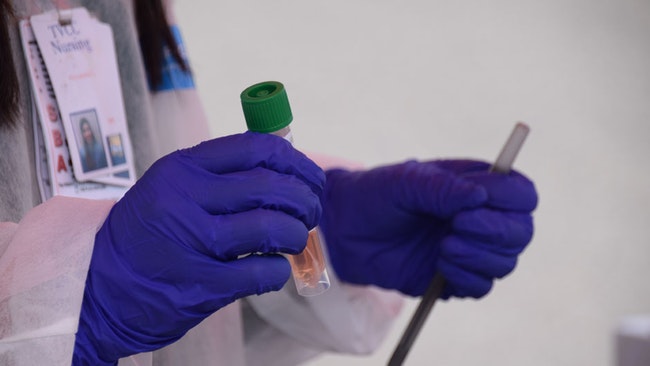
The first cases of fast-spreading Omicron variant of the coronavirus have been detected in Oregon. (The Enterprise/File)
Omicron has come to Oregon.
The Oregon Health Authority announced Monday evening that the highly infectious strain had been detected in three people in their 20s or 30s who have been fully vaccinated. The agency did not release any details about their identities, including their gender. The agency also said it does not yet have any information about their symptoms.
“We recognize this news is concerning to many people,” Dr. Dean Sidelinger, the state epidemiologist, said in a statement. “However, if history is our guide, we do know that even if a vaccine doesn’t target a specific variant, the strong immune response you get from being fully vaccinated can still be highly protective against severe disease from all COVID-19 variants.”
Oregon health officials have been expecting cases of the Covid variant to emerge for more than a week. Omicron has already been detected in dozens of states, including in Washington state, Idaho and California.
The variant was first identified in southern Africa last month. It appears to be much more contagious than Delta, quickly becoming the dominant strain in South Africa. Scientists in that country say that it may cause milder infections than Delta but that their information is still preliminary.
Oregon health officials have been urging people to get vaccinated to protect themselves, a message repeated by Gov. Kate Brown in the news release.
“As we continue to learn more about this new variant, we know the measures that are most effective in helping to keep ourselves and our families safe from Omicron, Delta and other Covid-19 variants: Get vaccinated, get your booster and wear a mask,” Brown said. “That’s the key to saving lives and keeping our businesses, schools and communities open. If you aren’t yet vaccinated or need a booster dose, get an appointment or find a walk-in vaccine clinic in your area today.”
Vaccinations have increased slightly since the beginning of the month. Oregon is now averaging nearly 23,000 shots a day, up from 20,000 two weeks ago. Nearly 80% of adults have received one shot, and 73% are fully vaccinated. More than 25% of adults have received a booster.The Omicron cases were discovered by Oregon Health & Science University, which is sequencing about 700 cases a week. When people are tested for the virus, the samples that are collected are analyzed by a molecular test which detects a mutation that can signal a potential case.
The three cases were flagged by OHSU scientists last week for sequencing. “Full genomic sequencing was completed this afternoon and confirmed the cases involve the Omicron variant,” Dr. Donna Hansel, chair of OHSU’s Department of Pathology and Laboratory Medicine, said in Monday’s statement.
The state public health lab is analyzing the genome of another 200 samples a week on average. It is in the process of increasing its testing capacity. The University of Oregon has a lab that can sequence 3,000 samples a week and some commercial labs around the state are also doing genetic sequencing as is Oregon State University. The university’s wastewater sampling program, which is testing sewage samples at 40 sites statewide, started looking for Omicron last week.
Oregon ranks 11th nationwide in the number of samples it’s sequencing.
Brown has not indicated that she would impose new restrictions in response to Omicron. Instead, state health officials have continued to emphasize vaccinations. The three vaccines now available are not tailored to fight the new variant, but they are broadly designed against the original strain and other variants.
It’s not known whether a common treatment against Covid-19 – monoclonal antibody infusions – will work against Omicron. Such infusions contain lab-manufactured antibodies to fight the virus and are most useful early in an infection before the virus takes a strong hold.
Scientists at Pfizer and Moderna said they’re working on creating a new version of their vaccines to fight the variant. But those won’t be available for at least 100 days.
Oregon Capital Chronicle is part of States Newsroom, a network of news bureaus supported by grants and a coalition of donors as a 501c(3) public charity. Oregon Capital Chronicle maintains editorial independence. Contact Editor Les Zaitz for questions: [email protected]. Follow Oregon Capital Chronicle on Facebook and Twitter.
NEWS TIP? Please send an email to [email protected] for our reporters to consider.




